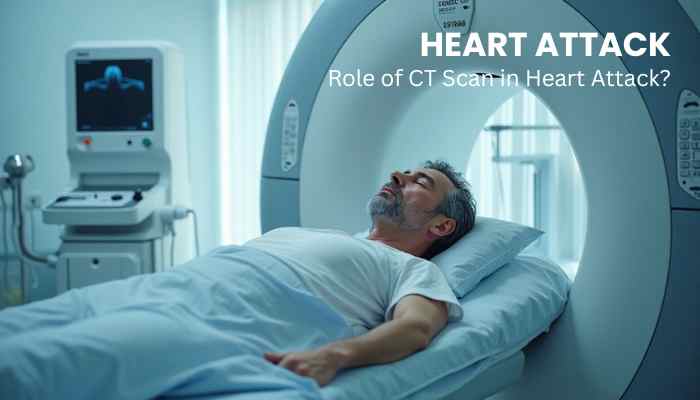What is the right time to use a CT scan to diagnose a heart attack? CT scan is a crucial tool in identifying and treating heart attacks.
A CT scan might further be recommended for coronary heart attack prognosis in favorable cases. Here are some instances-
- Quick prognosis: CT scans can be carried out quickly and provide specified images of the coronary heart and blood vessels. In cases where a rapid prognosis is warranted, like when a patient is suffering from acute chest pain and other symptoms of a coronary heart attack, a CT scan may even be recommended to help determine the cause of the symptoms.
- Non-invasive alternative: CT scans are a less invasive alternative to invasive methods like cardiac catheterization. In patients who can’t tolerate catheterization owing to clinical reasons or who would opt for much less invasive measures, a CT scan may also be advised.
- Evaluation of chest pain: Chest pain is a common symptom of coronary heart attack, but it can also be triggered with the help of other prerequisites like pulmonary embolism or aortic dissection. A CT scan can help differentiate between these prerequisites and determine the cause of the chest pain.
- Follow-up imaging: In the wake of a coronary heart attack, follow-up imaging can further be desired to monitor the patient’s recovery and check for any damage to the heart muscle. A CT scan can provide detailed images of the coronary heart and blood vessels to help uncover the patient’s situation over time.
It is important to comprehend that today not all patients with a suspected coronary heart attack will need to have a CT scan. The decision to employ this imaging examination will be dependent on the individual patient’s medical history, clinical presentation, and clinical judgment of the physician.
What is the Role of CT Scan in Heart Attack?
A CT scan is a diagnostic imaging test that utilizes X-rays and laptop know-how to generate precise images of the body. CT scans are useful in diagnosing various clinical conditions, along with a coronary heart attack.
In the event of a coronary heart attack, a CT scan may provide information on the severity and location of the blockage within the coronary arteries, which are the vessels supplying the coronary heart with oxygenated blood. The test can also reveal any damage to the coronary heart muscle activated through the coronary heart attack.
A CT scan may also be utilized to ascertain the size and quality of the heart, as well as the chambers and the valves. The statistics may help medical professionals determine the excellent course of a remedy for the patient.
In a few instances, a CT scan may further be used as an option for an invasive procedure known as cardiac catheterization. In cardiac catheterization, a long, flexible tube is put into a blood vessel and taken to the coronary heart to gather information on blood drift and blockages. CT scans, however, can provide similar information except for the need for an invasive procedure.
In general, a CT scan can be a valuable tool in the diagnosis and management of coronary heart attacks. But it is important to note that not all patients with suspected coronary heart attack will need a CT scan, and the decision to utilize this imaging examination will depend on the patient’s clinical history and medical presentation.
What are the Advantages of CT Scan in Cardiac Imaging?
Here we’re going to understand the CT cardiac scanning advantages –
- Anatomical Definition: CT scan of Cardiac health provides high-resolution, cross-sectional images, providing a clear picture of the heart and associated structures.
- Non-Invasive (for CTCA): CTCA is not an invasive procedure, unlike standard coronary angiography, which lessens the dangers of catheterization.
- Speed and Efficiency: CT scans are comparatively fast to do, which makes them useful in acute situations such as suspected pulmonary embolism.
- Large Field of View: CT is not only able to image the heart but also nearby structures such as the lungs and large blood vessels, giving a wider clinical context.
- Quantifiable Information: CT scanning may yield quantifiable information in the form of degree of stenosis in the coronary vessels or calcium score.
Limitation and Considerations of Cardiac CT Scan
As we’ve discussed about advantages of CT scan in Cardiac screening, here are some limitations and considerations of the same-
- Radiation Exposure – It uses ionizing radiations, it is generally lower but not suitable for everyone.
- Contrast agent risk: It is seen that the patient feels irritation or some allergy after contrast based CT Scan.
- Image quality interruption: It is important to stay still during the scanning procedure otherwise the constant motion can interrupt image quality and it can turn blur.
Conclusion
CT Scan of heart attack is a technique used to detect abnormalities in the heart and related areas. Understanding the right time for cardiac CT Scan is necessary and the same goes for understanding its procedure. There might be some points or limitations you need to know before undergoing the procedure. You can find the best imaging centre in Delhi through Carebox and get your CT Cardiac scan done at lowest cost.
FAQ’s
Q. What is the full form of CT Scan?
The full form of CT scan is computed tomography scan.
Q. What is the cost of a Heart CT scan in Delhi?
The cost of heart CT scan in Delhi ranges between 3000 to 8000 rs and it also varies on the diagnostics centres.
Q. How to book your CT scan of heart online?
You can book a CT scan of your heart at the best imaging centre near you online from the carebox website.
Q. Why is CT Scan of heart not recommended to you?
If you’re pregnant, or having an allergic reaction from iodine, Uncontrolled hypertension, Coagulopathy, your doctor will not recommend CT Scan of heart in this situation.


